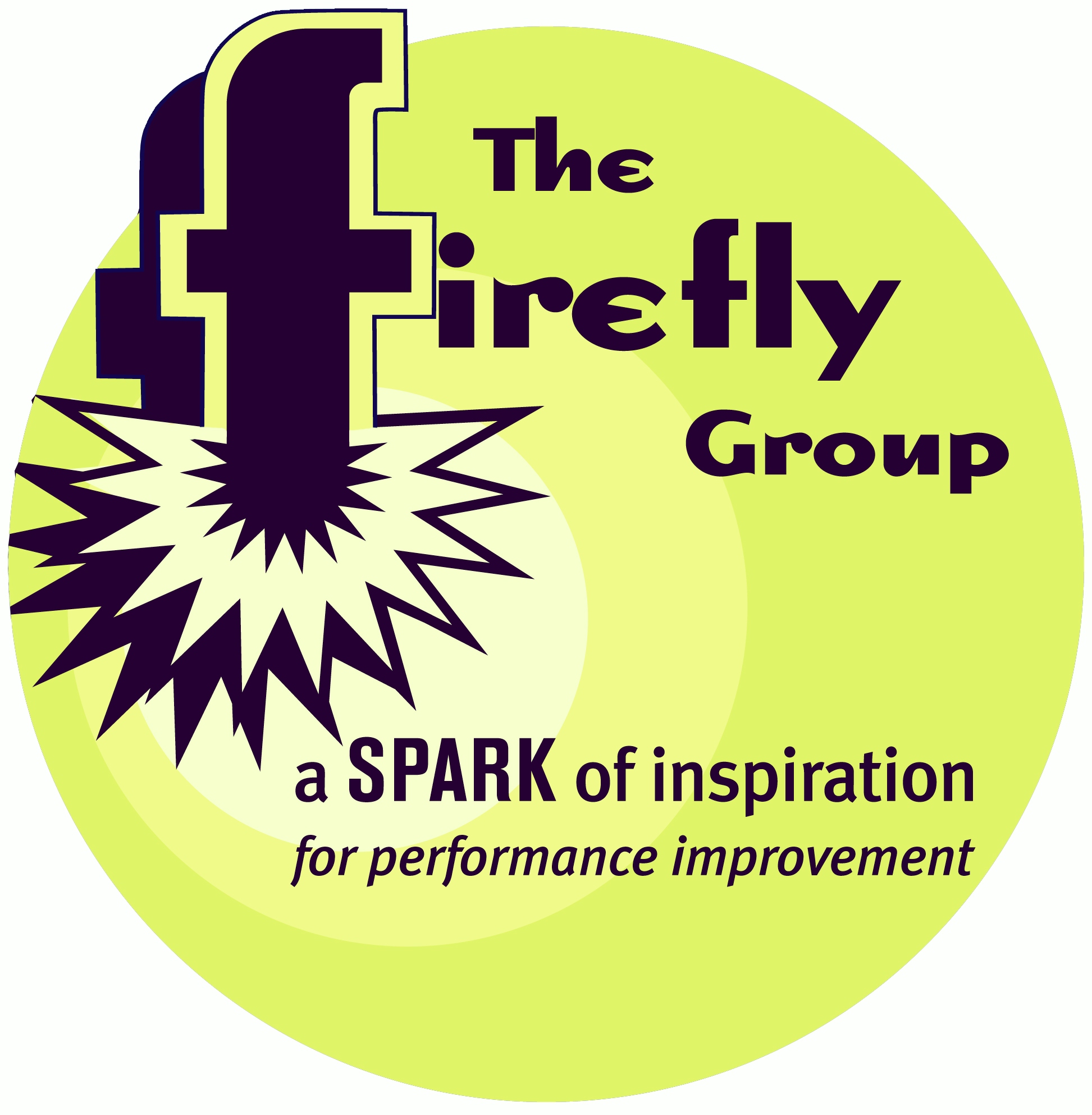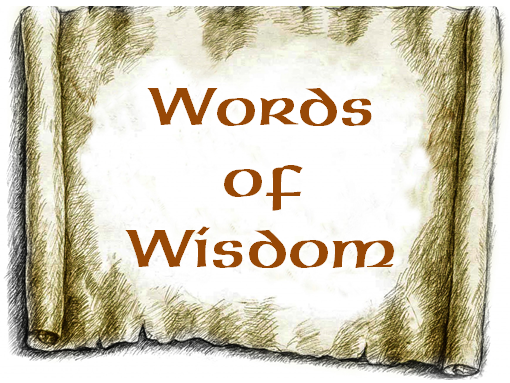

What's New

Words of Wisdom
52
cards and 15 activities to spark conversations and make sense of learning.
Learn more HERE.
What We Do
The Firefly Group helps people make sense of what they learn and experience.
Whether facilitating a group for better decision-making, keynoting a conference, leading a training, or writing an instructional design, we use novel methods that engage, spark creativity, and produce memorable results.
 If
this sounds like a good direction for your organization, let's talk about
how we might collaborate! Please give me a call (802.257.7247) or send an
. - Brian
If
this sounds like a good direction for your organization, let's talk about
how we might collaborate! Please give me a call (802.257.7247) or send an
. - Brian
 Your ETR (Estimated Time to Read): 10 minutes Your ETII (Estimated Time to Implement Ideas): 5 weeks |
July 2015
|
Say
It Quick |
Discoveries bits of serendipity to inspire and motivate |
Ideas fuel for your own continuous learning |
Activities tips and tricks you can try today |
| Lead Me, Please! | Peer Conferences | Post It! |
Experts have their place but sometimes we rely upon them too much. Discover the benefits of ignoring the specialists beginning with this story in exactly 99 words.
Lead Me, Please!
It's obvious the regulars of the Senior Aerobics Club come to socialize as much as to exercise. Jean was chatting with a friend as they waited for the instructor to arrive one early morning. "I don't know why we need a leader. We all know the routine," she said. "I guess it's just easier." Her friend agreed.When the regular teacher never arrived, they suffered with a substitute, someone known as "that bossy woman from New York."
Too bad it's so easy to be a follower when there are so many opportunities to be a leader.
 Peer
Conferences:
Peer
Conferences:
An Interview Adrian Segar
It seems that all professionals have their own conferences - even the professionals that organize conferences! So how do the organizers get organized? They turn to a specialist like Adrian Segar. Adrian has built a reputation for organizing peer conferences; meetings led and facilitated by the participants who show up. Here Adrian shares the benefits of an un-scripted conference and talks about the implications for any organizational or team meeting.
Brian Remer: Your work has focused on designing peer conferences. Can you briefly explain how they differ from most other conferences?
Adrian Segar: Traditional conferences consist largely of sessions predetermined in advance, with most sessions using a speaker-broadcast model. There is very little, if any, flow: sessions can be scheduled in any order. Making connections with other attendees is relegated to meals and socials outside the conference sessions.
Peer conferences use a beginning process where attendees learn about each other: why they are there, what they would like to have happen (desired learning, questions they want answered, etc.), and the expertise and experience individual participants possess. This sharing uncovers the true wants and needs of those present, rather than those predicted by a program committee in advance. Next a sign-up process is used, building a conference that is maximally beneficial for each participant.
The middle of a peer conference consists of these participant-generated sessions, which may be informal presentations, panels, discussions, workshops, etc., run or facilitated by participants with appropriate skills or experience and expertise.
The end of a peer conference typically consists of two sessions - a personal introspective and a group spective - which allow participants the opportunity to review in a structured way the changes each may wish to make as a result of the event, and to assess and work as a group on action outcomes that the conference brings up.
Participants love these events because a peer conference turns into what people actually want and need. Also, the quantity and quality of the connections people make with their peers during the meeting is much higher than what occurs at traditional events.
Remer: How did you become interested in peer conferences and how have your ideas about them evolved over the years?
Segar: I have been convening and organizing conferences related to my (now) five careers for over thirty years. In 1992, I organized a conference in a field that was so new that there were no experts to invite to speak. Realizing that the assembled attendees were, collectively, the "experts", I devised a peer conference format in response. The evaluations were so favorable that, over time, I was asked to facilitate peer conferences in subjects in which I was not professionally involved, and I continued to refine the process.
Eventually, on the basis of thousands of enthusiastic evaluations, I decided to write a book on peer conferences, and Conferences That Work: Creating Events That People Love was published in 2009. The Conferences That Work model is now used all over the world and I continue to work with the established meeting industry to popularize participant-driven and participation-rich events.
My second book, The Power of Participation: Creating Conferences That Deliver Learning, Connection, Engagement, and Action (just-published) concentrates on a finer level of meetings - the individual session itself - and is a compendium of techniques any meeting organizer, designer, or presenter can use to greatly improve any meeting session by turning passive attendees into active participants.
Remer: Most conference planners are under pressure to produce a flawless event. How do you work with these people to help them step out of their box and experiment with a peer conference format?
Segar: A good question! It's a tough sell, because we are often working in a culture where the fear of "failure" prevents offering opportunities for what I call risky learning. Consequently, meeting organizers fall back on the safe "one teacher-many learners" model that we all were indoctrinated in at school. However, an increasing number of conference planners realize that their attendees collectively possess far more experience and expertise than any single "speaker".
My work then is to convince them that peer conference formats are a far more effective way to tap into group knowledge and match it to participant needs than having a few people talk at an audience.
It's still true, however, that the most effective way to convince a conference planner of the value of peer conferences is to have them participate in one, as, afterwards, the vast majority of participants report that they don't want to attend traditional conferences any more.
Remer: When I've been a conference presenter, I always come prepared to facilitate a highly interactive session. How would I do the same in a peer conference if I wouldn't know what sessions people will want to create and attend?
Segar: Before a peer conference starts, no one knows what topics will be chosen, what formats will be used, or who will facilitate or lead sessions. If you have something you think may be of value to your peers, you should bring it to the conference and offer it, and it's quite possible people will want it, though there is no certainty. But the skills of a good facilitator are highly valued at peer conferences, because effective facilitation of sessions invariably improves their quality and usefulness to participants.
Remer: You've just written a new book. How is it different from your previous book, Conferences that Work?
Segar: My first book, Conferences That Work: Creating Events That People Love, covered the why and how of participant-driven events: conferences and professional meetings that become what the participants want and need them to be. It shared the rationale of the peer conference format I'd developed over the years, and comprehensively described how to organize and hold one. Once the book was published, I thought I had finished writing books.
Yet, as word of the book spread and increasing numbers of clients asked me to consult on event design, it became clear that there was a need for a book that concentrated on a finer level of detail: the meeting session itself. Over and over again, clients wanted to know how to improve their sessions - and by extension their events - as measured ultimately by increased attendee satisfaction and retention.
The Conferences That Work meeting format improves conferences immensely by providing structure and support for powerful participant connection and learning. But it does not directly address the design of individual conference sessions: the heart of any conference, whether traditional or participant-driven. Unfortunately, we have all spent far too much time sitting through boring and ineffective sessions listening to uninteresting and poorly presented content.
My new book The Power of Participation: Creating Conferences That Deliver Learning, Connection, Engagement, and Action explains and shows how to improve meeting and session effectiveness by turning passive attendees into active participants. The techniques I describe can be incorporated by any event organizer, presenter, or session facilitator who wants to maximize the learning, connection, engagement, community building, and consequential action that takes place during sessions and meetings.
Creating active participants is not hard. But the useful techniques are scattered among a range of practitioners, unfamiliar to most people, and consequently rarely used. The Power of Participation covers what you need to know in one place.
Remer: You've mentioned some of the elements or techniques of a successful peer conference. Are there ways to adapt those elements to other settings like organizational meetings, team briefings, strategic planning, and so forth?
Segar: Absolutely! Any meeting that requires input from attendees can benefit from these techniques (and, frankly, any meeting that can't is hardly something I'd call a "meeting"). For example, The Power of Participation includes seven chapters on participative voting techniques that focus on voting not as a method to make decisions but rather as a way to obtain valuable information from participants. Even meetings where all the participants already know each other well can benefit from processes that help focus on crucial issues and facilitate fruitful interaction, like The Three Questions, Post It!, Affinity Grouping, and Fishbowl. The book also includes a number of techniques that support effective action outcomes from meetings that need them, e.g. strategic planning sessions.
For more information:
Conferences that Work www.conferencesthatwork.com
Click on the images above to learn more about the books.
Big Name Experts
"I bet we could get business owners to come if we had a big name speaker."
This thought was offered by a colleague as we kicked around ideas for a local leadership conference. Unfortunately, we didn't have a "big name" budget to support this suggestion. For my colleague as well as for the people we wanted to engage, it was important to know something "big name" was going to happen at our meeting.
To be sure, participants are drawn to a big name. And big name people often have big ideas to share. (Though for some it may be little more than their own big name!) Unfortunately, as we search for a reputable expert, we invalidate our own expertise. We miss the opportunity to discover new ideas brewing among our colleagues. Peer conferences offer chance to reconnect with the knowledge and skills we've developed over years of professional work and personal living.
Jeff Hurt writes about the concept of Peerology, which was highlighted in the September 2014 issue of the Firefly News Flash. In Peerology, Hurt explains that an SME is not a "Subject Matter Expert" who has packaged knowledge to hand off to learners. Instead, an SME can refer to those who are "Subject Matter Experienced." With this distinction, we can challenge our mental model about what learning is and who initiates it. We can explore the possibility that everyone has something to contribute to the learning of the whole group.
Another perspective on the source of our expertise is the practice of Dialogue Education (Firefly News Flash August 2013). Dialogue Education is a product of the work of Jane Vella, educator and founder of Global Learning Partners, who has spent her career teaching in Africa, Asia, and North America. She gained expertise in applying the work of theorists such as Paulo Freire, Malcolm Knowles, Kurt Lewin, and Benjamin Bloom. Vella realized that people learn best when there is an atmosphere of mutual respect and a vigorous dialogue between teachers and learners as well as among learners and their peers.
The aerobics class of the 99-Word Story summarizes the problems when we wait around for big name expertise: less variety of instruction, complacency among learners, unhelpful information, irrelevant material, invalidation of personal experience, and disempowerment of participants.
Post It!
If you are looking for an example of how to elicit information from a group
and you would like to experience the elements of a peer conference, Adrian
has agreed to share an activity from his latest book, The Power of Participation:
Creating Conferences That Deliver Learning, Connection, Engagement, and Action.
POST IT! is a simple way to identify group topics and issues. You can use it with a large group or as a stand-alone conference session. In addition, POST IT! can enable a group to reflect upon members' learning.
Download a description in pdf format at this link.
And, when you give POST IT! a try with your group, what happened?
|
Whether you need a keynote speaker, or help with strategic planning, performance improvement, or training facilitators and trainers in your organization, I look forward to your call (802.257.7247) or . -- Brian |
Read previous
issues. Click Library!
To add or delete your name to our mailing list, email
with a short note in the subject line.
I want this newsletter to be practical, succinct, and thoughtful. If you have suggestions about how I can meet these criteria, please let me know! Send me an with your thoughts and ideas.
Home
| Services | Products
| Mission | Ideas
| The Group | The
Buzz
(c)
2015 The Firefly Group